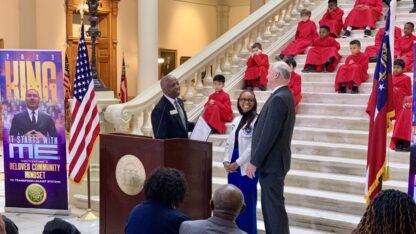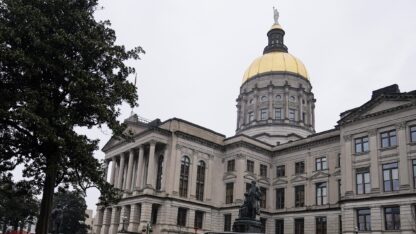Gov. Brian Kemp told Georgia lawmakers Tuesday that his plans to give raises to teachers, pay more tuition for many college students and invest in new housing are all designed to keep the state’s workforce growing and meet the needs of employers.
“The most valuable in-demand resource in our state right now is our people,” the Republican governor said. “We need to keep them, and the pipeline of skilled workers, wide open to keep up with that demand.”
Kemp spoke to lawmakers remotely from Davos, Switzerland, where he’s attending the World Economic Forum. Kemp defended his attendance at a meeting that some conservatives lampoon as a haven of global elitists.
“For anyone wondering why I’m here, I’ll be happy to tell everyone how others can benefit from hearing about our conservative principles and our approach both to budgeting and to job creation, to take the path that we’ve been on in our state,” Kemp said by video.
The governor proposes increasing spending in the current budget year by $2.4 billion, largely to pay for a pair of billion-dollar tax givebacks, and then to maintain spending in next year’s budget, funding $2,000 pay increases for all state and university employees and public school teachers.
Kemp would also end the two-tier system of HOPE Scholarships starting next fall, paying full college tuition for every high school graduate with a B average. Now, regular HOPE recipients get 90% of tuition. Kemp said restoring full eligibility would cost $61 million more in lottery proceeds.
The governor wants to spend $35.7 million to develop housing for workers near large industries locating in rural areas, saying a lack of housing is now “the biggest challenge” to business growth.
“This will allow us to partner directly with local governments in developing sites across the state to address workforce housing needs that come with these major economic development announcements,” Kemp said.
Georgia saw state revenues spike to $36.6 billion in the year ending June 30. Revenues had originally been projected to fall back to $30.2 billion this year. But through December, the halfway point of the 2023 budget year, tax receipts are running nearly $1 billion above that projection.
State economist Jeffrey Dorfman told lawmakers last year’s spike was due largely to capital gains taxes paid on investment gains, and said he projects those gains will evaporate this year. He said corporate income tax collections remain surprisingly strong, but he projects they will fall in the second half of the budget year. Sales taxes, though, are being collected on inflated prices and are likely to stay strong.
The state now projects it will collect $32.6 billion this year, a surplus of $2.4 billion.
The projected surplus would add to $6.6 billion in spare cash Georgia already has, even after filling its savings account to the legal limit. The revenue growth means Kemp won’t have to dip into that spare cash to fund another $1 billion round of state income tax rebates, which would give taxpayers between $250 and $500 back. The surplus also would not be needed to pay for a $1.1 billion property tax rebate for homeowners, which Kemp says would give the typical homeowner about $500.
The governor does propose using $1.1 billion of the $6.6 billion to refill roadbuilding funds making up for fuel taxes Georgia did not collect in the first six months of the budget year; a tax holiday that came in response to spiking gas prices. But more than $5 billion could be left.









